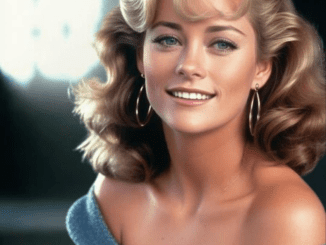Aisha Tyler, the talented actress who portrayed Charlie Wheeler on the beloved sitcom Friends, has recently spoken out about her experience on the show and the wider issue of its lack of diversity. Despite being one of the few Black characters in the series, Tyler’s role was groundbreaking, but it also came with its own set of challenges. In a recent interview, the actress reflected on how her race was perceived both on and off-screen, sharing her thoughts on the progress Hollywood has made—and the barriers that still persist.
Breaking Ground: Aisha Tyler as the First Recurring Black Character on Friends

When Aisha Tyler joined the cast of Friends in 2003, she made history as the first recurring Black character in a series that, up until that point, had been criticized for its lack of diversity. Tyler played Charlie Wheeler, a smart, accomplished paleontology professor who became romantically involved with two of the main characters—first Joey, then Ross.
For many, her casting was seen as a positive step toward representation, especially on a show as globally popular as Friends. However, Tyler’s experience wasn’t without complications. During her recent interview, she opened up about being labeled as the “Black girl from Friends” by fans—a phrase that followed her throughout her time on the show and beyond.
Dealing with the Label: The Impact of Being Known as the ‘Black Girl from Friends’
While Tyler’s role on Friends was an achievement, she revealed that being constantly identified by her race rather than her character’s attributes was challenging. “It was such a common refrain at the time,” Tyler shared. She explained that the lack of diversity on the show was a point of discussion even when the series originally aired, but it wasn’t until later that the conversation gained wider traction.
This constant focus on her race wasn’t unique to her role on Friends—it was reflective of a broader issue in Hollywood. Actors of color often find themselves reduced to their racial identity, rather than being recognized for their talent or the complexity of their characters. For Tyler, this experience was frustrating but also illuminating, as it highlighted the work that still needed to be done in terms of representation.
The Push for Diversity: David Schwimmer’s Role in Casting Aisha Tyler
Interestingly, Tyler also noted that her character’s race wasn’t specified in the original script. She mentioned that David Schwimmer, who played Ross on the show, actively pushed for more diversity in casting. This advocacy resulted in Tyler being cast in the role, but it also pointed to the fact that the lack of diversity wasn’t entirely intentional—it was a product of an industry that wasn’t prioritizing inclusive storytelling.
“There was nothing in the writing of my character that indicated she was supposed to be a woman of color,” Tyler shared. “But I know that David really pushed for more diversity, and I think that’s wonderful.” Tyler’s presence on the show was an important step, but as she herself acknowledged, it was only a small move in the right direction.
Representation Beyond Stereotypes: Tyler’s Character and What It Meant
One of the things Tyler appreciated about her role on Friends was that her character, Charlie, wasn’t defined by her race. Instead, she was portrayed as a smart, confident woman who just happened to be Black. This was rare at the time, as many Black characters in television and film were written with their race as the central aspect of their identity.
“What I liked was that they wrote this smart, sexy character, and she happened to be Black,” Tyler said. “They weren’t trying to seismically change what the show was, but they were aware of the fact that it didn’t feel totally representative of the world as it existed.” Tyler’s portrayal of Charlie was significant because it allowed for a more nuanced representation of a Black woman on mainstream television.
The Broader Issue: Hollywood’s Struggle with Diversity
High fives for Aisha Tyler's birthday! #FRIENDS pic.twitter.com/v2aj5TcUA6
— FRIENDS (@FriendsTV) September 18, 2023
Tyler’s experiences on Friends are emblematic of a broader issue in Hollywood, where diversity is often treated as an afterthought. For years, studios and networks operated under the assumption that audiences wouldn’t respond to shows or movies with diverse casts, a perspective that Tyler calls “ridiculous.”
In her interview, Tyler spoke candidly about how this mindset affected her career. “There were times when I was auditioning for roles, and I was told, ‘We’ve already cast our Black character,’” she recalled. “And I’m thinking, ‘Have you never seen two Black people in the same room? Is there just one of us?’”
This tokenism—where one Black character is considered enough for an entire production—has long been a problem in the entertainment industry. Tyler’s frustration with this approach is shared by many actors of color, who often find themselves competing for the same few roles, even as audiences are calling for more diverse stories.
A Changing Landscape: Progress and Hope for the Future
Despite the challenges, Tyler is optimistic about the future of diversity in Hollywood. She expressed excitement about the increasing number of stories being told from different perspectives, highlighting the importance of human stories that reflect the diversity of the world.

“We know that great stories are human stories,” she said. “And they’re varied and diverse and compelling. People want to learn about other experiences and have experiences they haven’t had before.”
In recent years, Hollywood has made significant strides toward greater inclusivity, with more shows and films featuring characters from a wide range of backgrounds. Tyler herself has been a part of this change, both as an actress and as a director and producer, using her platform to advocate for more diverse storytelling.
Conclusion: Aisha Tyler’s Role as a Catalyst for Change
Aisha Tyler’s experience on Friends may have been complicated by the lack of diversity on the show, but her role was an important step forward. By portraying a character who wasn’t defined by her race, Tyler helped challenge the industry’s narrow view of representation. While there is still work to be done, Tyler’s career serves as a reminder that progress is possible—and that change often starts with a single step.
As Hollywood continues to evolve, Tyler’s voice remains a crucial part of the conversation about diversity, representation, and the power of storytelling.


